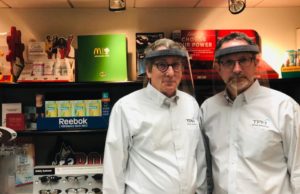The article below was published in Forbes Magazine’s May 14th issue. It is featuring one of our clients, Phil and David Schmidt of TPH Global Solutions. This is a demonstration of pivoting and resilience in these new times and in dealing with these new challenges. Let me know your thoughts.
“Until recently, brothers David and Philip Schmidt were operating business as usual. As second-generation owners and managers of TPH Global Solutions® (short for “The Packaging House”), their 55-year-old, privately-held retail packaging and POP display company was hyper focused on helping clients get their products to market, often at well-known retailers like Costco, Walmart, Home Depot, and others.
The Packaging House
As David Schmidt describes it, “we like to say that our mission is [that] we make it easy for [established and emerging brands] to get their products to market in a complicated world.” But of course, the world has since become more complicated than usual.
COVID-19 upended retail in March, slowing if not stalling much of the business. David knew his team had to do something to keep all of their staff employed. “As part of our workforce, [many of our employees] have been with us an average of 15 to 20 years. These are people that we hired when they were young, and now they have young families. Our family feels a tremendous responsibility to them.”
David had heard stories about PPE and other types of shortages across the healthcare system. One story in particular—news of doctors and healthcare workers contracting COVID-19—stuck with him. It was then that David and his brother Philip decided to pivot a percentage of their efforts from retail packaging and display to manufacturing personal protective equipment (PPE) face shields.
Amazingly, “this pivot actually came about very quickly,” Schmidt said. David and Philip agreed on simple goals. “We wanted to develop a product that we could quickly and safely put in the hands of frontline healthcare workers and first responders. We wanted to do whatever we could to help protect them.”
From a concept in 24 hours to delivery in three weeks
The Schmidt brothers sketched out a design and enlisted their design team to flesh out details, quickly identifying needed parts and components. Within 24 hours, they had a confirmed face-shield design. They immediately engaged local manufacturing partners for development and ordering within the Chicago area, moving from an idea generated on Monday to issuing purchase orders on Thursday. In approximately three short weeks, they were shipping their first face shields to hospitals, first in the Midwest and then across the nation.
To ensure regulatory and safety requirements, TPH quickly became an FDA-registered business as well as a registered importer. As of mid-May, they had shipped over 200,000 face shields.
“By happenstance, someone referred us to one of the VA hospitals in Long Beach, California, and they were so grateful that we were able to help them, that the medical director there referred us on to all the other VA hospitals. Now we are supporting the VA hospitals of America with face shields. The emails we get from them are, ‘Thank you. You’re saving lives,’ and that says it all,” said Schmidt.
Perhaps most importantly, TPH has been able to retain all employees to date, even the ones they had just recently hired.
Mobility helps extend the office
Mobility and remote working have enabled TPH to successfully pivot their business. “A business [like] ours has to be engaged,” said Schmidt. “We’re a high-touch type of business. Because we are under work-from-home orders in the state of Illinois and we have been and will be for some time, we are able to call-forward our office phones to our cellphones. So right away our cellphones [became] an extension of our office environment. It’s critical that our team has both the technology, and the devices, and the wherewithal to work [from wherever they need to].”
Not only does the business depend on mobility to conduct work and stay connected but David said his extended family is also relying on cellular service. David’s daughter is an elementary school teacher and when their standard internet connection went down temporarily, it could have been disastrous for her 20+ students. However, with a T-Mobile hotspot and her cell phone, she was able to successfully conduct a two-hour video class.
As the pandemic situation evolves so will TPH. “We continue to evolve, and improve, and get better, but I can’t imagine [doing any of this without] our mobile devices,” Schmidt said. The pivot has been so successful that the company is now looking to expand the PPE effort, going beyond the face shields for hospitals to produce medical-grade cloth masks that will soon be available to the public.
TPH is treating the new PPE, health and safety side of the business as they would a startup, rather than an extension of their core business. Schmidt sees this as a venture that can move quicker than their traditional business yet leverage the infrastructure and experience they already have. “And so now it just creates this whole other business opportunity. We’re not out to make a million dollars today. We’re out to get the goods into people’s hands in the most cost-effective way possible,” said Schmidt. “We’re actually looking for long-term relationships with hospitals, with industries, with food service, with anybody who wants to develop a relationship with us and that we can support.”
